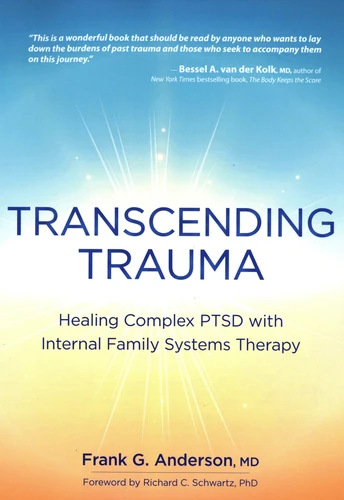Transcending Trauma. Healing Complex PTSD with Internal Family Systems Therapy
Par :Formats :
- Paiement en ligne :
- Livraison à domicile ou en point Mondial Relay indisponible
- Retrait Click and Collect en magasin gratuit
- Réservation en ligne avec paiement en magasin :
- Indisponible pour réserver et payer en magasin
- Nombre de pages204
- PrésentationBroché
- FormatGrand Format
- Poids0.431 kg
- Dimensions17,8 cm × 25,4 cm × 1,3 cm
- ISBN978-1-68373-397-3
- EAN9781683733973
- Date de parution19/05/2021
- ÉditeurBookmasters
Résumé
Hope and light are on the horizon to help clients overcome the pain and heartache of relational trauma. The highly acclaimed Transcending Trauma explores a unique, compassionate, and evidence-based approach to resolving complex and dissociative trauma. In this transformative book, Frank Anderson, MD, masterfully details an IFS path to therapy that allows clients to access their inherent capacity for healing - called Self-energy - while also helping them welcome, as opposed to associated with trauma.
Included are clinical case examples, summary charts, current neuroscience research, and personal stories that will enable your clients to reclaim self-connection, experience self-love, and regain the ability to connect with and love others. This book offers a comprehensive map to complex trauma treatment that will enable readers to : Learn how to stay calm and steady in the presence of extreme symptoms ; Discover a different approach to resolving attachment trauma ; Gain confidence when addressing shame, neglect, and dissociation ; Integrate neuroscience-informed therapeutic interventions ; Effectively address medications and comorbidities ; Incorporate IFS with other models of treatment
Included are clinical case examples, summary charts, current neuroscience research, and personal stories that will enable your clients to reclaim self-connection, experience self-love, and regain the ability to connect with and love others. This book offers a comprehensive map to complex trauma treatment that will enable readers to : Learn how to stay calm and steady in the presence of extreme symptoms ; Discover a different approach to resolving attachment trauma ; Gain confidence when addressing shame, neglect, and dissociation ; Integrate neuroscience-informed therapeutic interventions ; Effectively address medications and comorbidities ; Incorporate IFS with other models of treatment
Hope and light are on the horizon to help clients overcome the pain and heartache of relational trauma. The highly acclaimed Transcending Trauma explores a unique, compassionate, and evidence-based approach to resolving complex and dissociative trauma. In this transformative book, Frank Anderson, MD, masterfully details an IFS path to therapy that allows clients to access their inherent capacity for healing - called Self-energy - while also helping them welcome, as opposed to associated with trauma.
Included are clinical case examples, summary charts, current neuroscience research, and personal stories that will enable your clients to reclaim self-connection, experience self-love, and regain the ability to connect with and love others. This book offers a comprehensive map to complex trauma treatment that will enable readers to : Learn how to stay calm and steady in the presence of extreme symptoms ; Discover a different approach to resolving attachment trauma ; Gain confidence when addressing shame, neglect, and dissociation ; Integrate neuroscience-informed therapeutic interventions ; Effectively address medications and comorbidities ; Incorporate IFS with other models of treatment
Included are clinical case examples, summary charts, current neuroscience research, and personal stories that will enable your clients to reclaim self-connection, experience self-love, and regain the ability to connect with and love others. This book offers a comprehensive map to complex trauma treatment that will enable readers to : Learn how to stay calm and steady in the presence of extreme symptoms ; Discover a different approach to resolving attachment trauma ; Gain confidence when addressing shame, neglect, and dissociation ; Integrate neuroscience-informed therapeutic interventions ; Effectively address medications and comorbidities ; Incorporate IFS with other models of treatment


